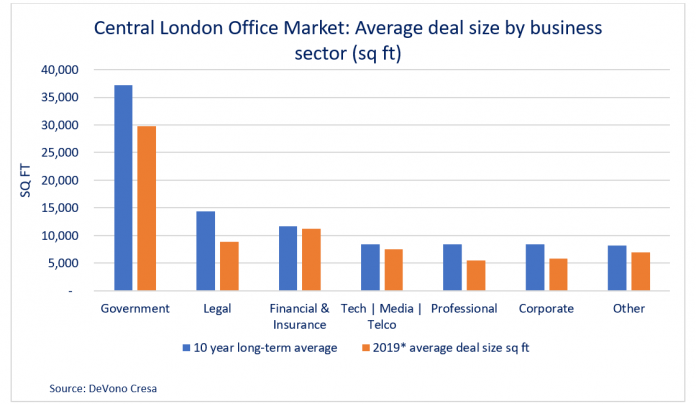After three long years since the UK triggered Article 50, the UK has now officially left the EU. However, with 2020 set to see UK and EU negotiators enter what is widely expected to be a series of protracted and uncertain trade negotiations, the final impact of Brexit is far from clear.
The 2016 EU referendum directly impacted the property sector and office search, leading to a significant slowdown in leasing across central London and major cities around the UK. The market however, did rebound in 2017-18. Whilst leasing activity proved robust in 2019, DeVono Cresa data shows that businesses were cautious regarding the volume of space leased, particularly in central London.
2019 data indicates that the average size of office space leased was down 15% versus the long-term average (11,040 sq ft vs 9,338 sq ft). All major business sectors saw a shift downwards in terms of the size of space taken. Legal, Professional and Corporate saw the largest drop (see below chart), with deal sizes down by around a third versus the long-term average.
Shaun Dawson, Head of Insights at DeVono Cresa commented: “Brexit is of course only one-factor influencing decisions on space planning, with others including the steady increase in the use of technology, the need for more agile working, and an increasing focus on staff wellbeing.
“Another sign of previous economic and political uncertainty is the uplift in interest in short-term and flexible leasing.”
Developments in the market mean that businesses can now quickly access fully serviced offices. Many managers see this as a way to mitigate short-term uncertainty whilst also gaining better facilities – with design-led spaces, additional meeting rooms, and communal areas for collaboration all available.
Perks such as on-site gyms and organised wellness programmes are often included, in addition to easy networking for specialist skillsets and outsourced site management. There is also a growing interest in searches for both leasehold and serviced or managed offices. All sizes of businesses, from all sectors, are participating in this trend, up 35% in 2019 according to DeVono Cresa data.
Dawson added: “This analysis highlights how Brexit occurred at a time when the traditional office leasing market was going through a number of important paradigm shifts. As a result, DeVono Cresa believes it makes more sense to engage a trusted real estate partner to ensure that the search and selection process delivers the best space for the business – whether this is a move to a smaller space, a different type of lease, or even a different location.”
The December 2019 UK general election and sizeable parliamentary majority for the government however, has inserted a much-needed boost of political and economic certainty into the market, opening up the next phase of the Brexit divorce – trade talks. The UK is looking to sign trade deals on both sides of the Atlantic, though the next 11 months are not expected to be a breeze for UK negotiators.
However, with employment at record levels and positive murmurings from key sectors such as manufacturing and services, 2020 has begun in a more upbeat manner than widely anticipated.
Luke Philpott Joint CEO of DeVono Cresa stated: “Global investment into the UK, and London specifically, is expected to pick up over the course of 2020, as greater political clarity and direction on economic spend has boosted investor confidence. Since the election, client search requests have risen by 40%.”
Whether it is investment into existing businesses, the facilitation of 5G roll-out, commercial real estate demand, or infrastructure and education sector spend, the UK will seek to capitalise on its ability to trade on its own in a post-Brexit context.” Philpott added.






















